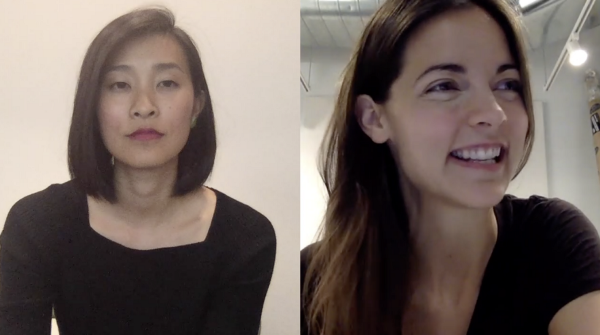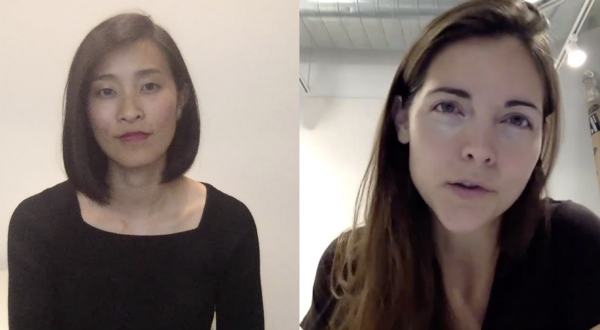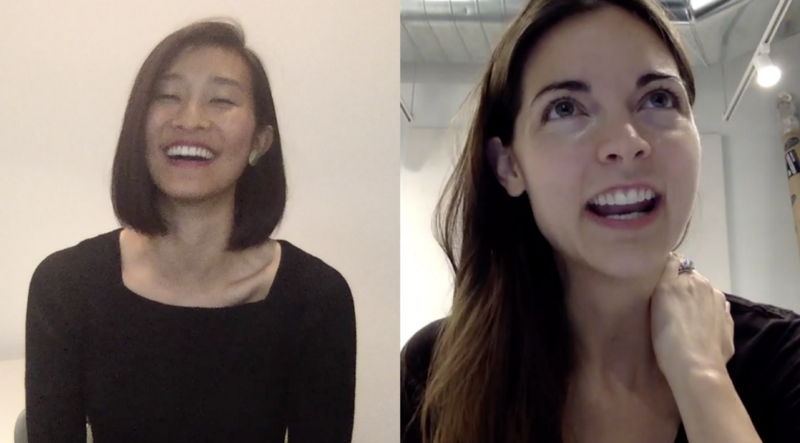As the founder + CEO of a company serving 75 million people worldwide, Kathryn shares her biggest leadership lessons around trusting your gut.
Every two weeks as part of The Heartbeat podcast, I
Kathryn Minshew is the Co-Founder and CEO of The Muse, a company that helps over 75 million people around the world find jobs and get career advice. In our interview, she shares the importance of trusting your gut, developing that instinct, and her framework for decision-making.
Claire: Hey, everyone. I’m Claire Lew and I’m the CEO of Know Your Company. Today I am absolutely thrilled to have with me someone super special. I have Kathryn Minshew, who’s the co-founder and CEO of The Muse. You’ve probably heard of The Muse if you’ve ever been on a job search because they actually serve I believe over 75 million people in helping them navigate their careers, which is pretty phenomenal. Kathryn is someone who I’ve definitely looked up to in the industry. Just been a big admirer of your work. I know you recently published a book called I think it’s “The New Ways of Work.”
Kathryn: “New Rules of Work.”
Claire: Excuse me, “New Rules of Work.” Just so excited to be able to ask you this one question about leadership.
Kathryn: Wonderful. Thank you so much for having me. I’m really excited we’re able to do this too.
Claire: Cool. Well, all right, Kathryn, here’s the question, it’s what’s something you wish you would have learned earlier as a leader?
Kathryn: Oh.
I wish I would have learned to trust my instincts. I started The Muse when I was 25, seven years ago. Because I was so young, I was conscious of my inexperience, I sometimes I let other people overly influence the decisions that I made because it felt like I was so new to starting a business.
Claire: Yes.

Kathryn: As I look back, my instincts actually served me pretty well. Sometimes I trusted them and it was absolutely the right decisions. There were other times when I overruled them and went against my better my better judgment and I regretted it. I think on top of just the trusting your instincts, obviously I’m not the first person to give that advice, but I also think when you’re a leader and particularly when you’re the CEO of a company, a startup, at the end of the day, everything that goes wrong or that doesn’t work out, like you bear the ultimate responsibility for the success or failure of initiatives, of the business, et cetera.
I think when things don’t go wrong but you made that decision at your call, it’s hard, but you can live with that because you made the wrong call. We all make the wrong call. When something happens, if there’s a failure and you knew better, you overruled your own instinct, you let someone else make a decision that really you felt deep in your gut probably should have gone differently, I think those for me are the hardest mistakes to live with. Ultimately, I would rather trust my instincts, make the calls, and deal with the results good and bad.
Claire: Absolutely. I’m over here sort of nodding my head laughing because I’m like, “I can totally relate,” having started running Know Your Company when I was 24. I don’t think there was a bigger case of imposter syndrome. When that happens, I think there’s something to be said about being young, whether it’s being a woman or whatever it is, or a feeling as though you need to take in other people’s opinions for whatever reasons that there are. I think in a world where as a CEO you are inundated with advice all the time, there’s no shortage of articles or hey, video interviews about advice, it can be very easy to sort of get pushed one way or another.
For folks who are watching this, would you say that there’s a spectrum of decisions in which they should sort of rely on that instinct? I mean in what situation do you feel like that’s the way to go? For example, do you feel like it’s when the decision is really big, is a really tough one to make, do you feel like when … What if it’s not your expertise, right? Just to push back. Someone might be watching this and going, “Well, Kathryn, what if it’s not within your expertise? Do you still go with your gut?”
I mean for you, what have you learned? Was there a specific situation or how do you sort of process how you make those decisions? Threw a few questions there at you.
Kathryn: Yes. First of all, I think getting better at making decisions, particularly small decisions, is something that I am actively working at right now.
Because as you build a company, especially if you’re trying to do something that no one’s ever done before, you are calling countless problems, you’re making countless decisions, and that can be exhausting. First of all, I’ve tried to get better at dividing decisions into two categories.
There are smaller decisions. This also includes maybe big decisions, but ones that are reversible. If you choose course A but you realize pretty quickly it’s not right, can you just choose course B instead.
These decisions I try and make quickly. I often try and delegate. I think that you can get bogged down as a leader in over analyzing these decisions, which I have definitely been guilty of, but I’m working to just ensure like, “Okay. How big is this decision? What are the impacts of getting it wrong? Can we change our minds?” If the answer to those three is sort of a green light, then try to make it quickly and move on. The other types of decisions I think are the sort of bigger, thornier decisions. To me, I think it depends.

Is this a guiding light or a principle’s decision or is this a sort of structural or tactics decision? I’ll give you an example. This is a metaphor I’ve been thinking about recently. I don’t think it’s a particularly good one, but it’s the best I’ve got, which is in the early days of starting a business, you’re almost an explorer. Think sort of Lewis and Clark. You’re charting the wilderness and you have an idea. You have a small team, but ultimately you’re deciding where to go. At some point, you find sort of your product market fit, your sweet spot, and then you start building a town.
You can be an explorer with great instincts and some level of training or very little training to some extent. But if you’re building a town, you may want to actually bring in like plumbers and electricians and people that have deep technical expertise.
For things like that, I would empower those people. Let them make decisions. Let them really lean into their skillsets because you hired them for a reason, right? It’s not necessarily your job to know how to be a better electrician than the person you’ve hired to help build your town.
Claire: Sure.
Kathryn: But when it comes to sort of principles, the core ethics, the values, the big picture direction questions of how that town comes to be, I think is where you can’t delegate because I think those are the most weighty, and they’re also the ones that are hardest to undo.
People talk a lot about building culture, but changing culture is very hard. I think understanding where decision falls and how sort of irreversible it is is a really important tactic for deciding whether and how to delegate or when you need to just make and own that decision.
In fairness, I get a lot of advice.
When I was earlier in my leadership journey, people often mistook my interest in their advice for, “Oh, well, don’t just do what I tell you to.” I’m like, “Don’t worry I won’t.” I really appreciate and enjoy hearing different perspectives, and it’s an ingredient to my own thinking that ultimately produces a sense of what the right answer is likely to be.
Claire: Absolutely. I do like the explorer analogy because I think what we often forget as CEOs is as an explorer, your role is to say, “Hey, here’s the kind of town you want to be. Here are the things we want to stand for. Here are the kinds of people we want to attract,” et cetera. You could take this metaphor in a lot of ways. I think your point about the tactical decisions to getting to that point, you might not always need to be relying on your instincts and you can delegate those decisions, et cetera, and rely on expertise to carry them out, but there’s something to be said for making a stand.
It makes me think of this quote, what you’re talking about, is “What hill do you want to die on?” For the decisions that are irreversible, those are the ones you want to make sure are with your core. One thing that you alluded to is this idea of taking in people’s perspectives as an ingredient to building out your own perspective. What advice do you have for entrepreneurs, leaders, managers who are trying to enrich their perspective, who are trying to develop a better gut instinct? Is there a way to do that?
Kathryn: I think there is.
Firstly, I try and speak to at least three different people for any big decision or any area where it’s newer to me and I’m learning. In particular, it’s not just any three people.
One of those people, I like to find someone who is very similar to myself. Let’s say it’s a big fundraising decision or some sort of CEO strategic decision, I will specifically look for a woman CEO who potentially has had somewhat of a similar years of experience before starting a business. It doesn’t have to be spot on.
Claire: Sure.
Kathryn: This is helpful because sometimes people … When I was fundraising for The Muse in the early days, there were not a lot of women fundraising. I got a lot of really well-intentioned advice from them and a lot of it just didn’t work. The first time I really started talking to other women who had raised, I was like, “Oh, their experience is a little more relevant in this because there’s a factor about fundraising that makes a difference,” particularly in 2011–2012. I hope that’s changing. TBD on whether it is fast enough.
Claire: I’m with you.

Kathryn: But anyway, I would look for someone whose experience was similar. On the flip side, I also like to make sure that one of those people is someone whose experience is very different and whose perspective is likely to be very different. I have an old friend, someone that I love talking to about business issues, who could not be more different in a lot of his leadership styles. He’s a very aggressive leader. I mean he’s known for in sort of the entrepreneurship ecosystem for big, bold, offensive, controversial bets, and yet he’s a phenomenal resource because I have a little bit more of a collaborative style.
And yet sometimes I think that this is the sort of playing field available options and he’s like, “Yeah. Also, you could over there or over there,” and it widens my understanding of what decisions are possible and what factors someone totally unlike me would consider. I think that’s a really useful element of developing your gut as well is spending time and developing deep relationships with people who might have a totally different approach or perspective. Then the third person is kind of just someone I think might have expertise or relevant something to share.
It’s less particularly important, but I think getting both the sort of near term perspective and the far away.
Then usually if it’s a big decision, I try and sleep on it at least one night because sometimes it’s like it’s putting all the ingredients in the sort of cocktail shaker of your brain. You shake it up. You let it settle and then in a day or two it becomes clear what you want to do.
Claire: Absolutely. No, I think that’s invaluable advice and something that I’m going to be taking away and thinking about how can you sort of set out those differences and opinions to be able to form your own and then give yourself the time to let it percolate and have whatever pours out of that cocktail shaker to be really good instinct.
Kathryn: I’ll add one other thing, which I’ve been trying to do more recently, which is vision retrospective.
Claire: Yes.
Kathryn: I think to the question about developing a gut, it’s not only important to practice making better decisions, but also after the decision has been made, whether it’s a couple days, a week, three months, looking back and thinking, “Why did I make that decision the way that I did? What were the factors that influenced me? Am I happy with how it turned out? If not, what additional information or insight?”
I think you have to be nice to yourself. Like you’re not going to make all the decisions well and sometimes you’re like, “You know, it would have been great to know that, but I had no idea.”
That’s fine, but sometimes you can realize patterns like, “Oh, I was too loyal to this idea or this principle. I was blind to this thing. If I just asked this person’s perspective or if I have done this type of diligence, I would have uncovered the information that might have changed my mind.” That’s incredibly helpful because you learn those skills and they translate to better decisions in the future.
Claire: That’s invaluable, invaluable advice. I think everyone who’s watching this is going to be thinking, “All right. How am I going to be developing my gut instinct better and leaning on that maybe a little bit more in the bigger decisions?” Well, Kathryn, thank you so much again. It’s been an honor to be able to have this conversation. I know folks who are watching have learned a lot.
Kathryn: Well, thank you so much for having me. I really enjoyed it, and I look forward to hopefully doing this again some time.
Claire: Awesome.

